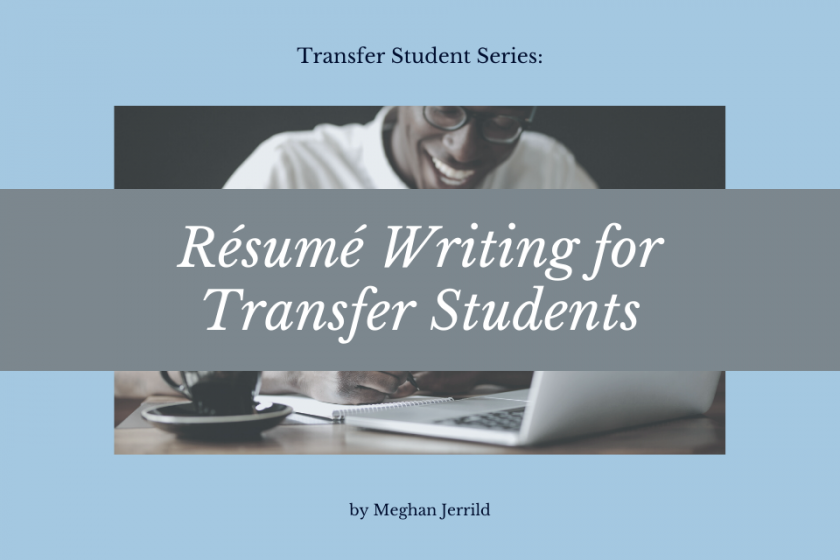
Maybe you have finally encountered your dream internship opportunity, or maybe you are just trying to take the next step on your career path. No matter what the reason is for working on your résumé, you should be proud of yourself for making time for your professional development! For transfer students, résumé writing can be a bit different from résumé writing for traditional students. When should you list your previous institution? Should you include your work experience? Are recruiters only looking for student activities? In this article, I will answer some of your burning questions and provide you with some tips to craft your résumé in a way that tells your unique transfer story to employers.
Taking Inventory of Your Resources
- Pull up all previous versions of your résumé so they’re ready to go. If you haven’t written one before, that’s fine too!
- Make a list of all jobs, volunteer work, skills, and other experiences you can think of. You are going to want to have as many options as possible when tailoring your résumé for each unique situation.
- Check out our Résumé and Cover Letter Guide. This PDF packs in a ton of important information on formatting, categories, writing bullet point statements, how to apply to a position, and so much more. Be sure to read through this while crafting your document.
- This Résumé Sample Binder is also available for you, with over 50 sample résumés to reference. You can even use the Table of Contents to sort by major and content area.
- You can actually talk to a human being: Schedule a 20-minute Résumé Critique appointment with us at the Center for Career Development, or schedule a Career Coaching appointment with a staff member for a more in-depth conversation about your career goals.
When to List your Previous Institution
There are a few factors to keep in mind here. Ultimately, the degree you are pursuing at UConn is likely going to be the highest level of education you have achieved up to that point. However, there are a handful of reasons you might want to include your past education on your résumé:
- You earned a relevant degree or certificate. If you believe this achievement is something that might be relevant to the position you are applying for or will help you stand out, by all means, include it. For example, if you earned an Associate in Science in Business Administration and are pursuing a marketing career, you might want to show that off.
- You received academic acknowledgments. Perhaps you are looking for a job in the field of mathematics and you want your potential future employer to know that you were awarded multiple prestigious math achievement awards at your last college.
- You want to list relevant coursework. If you took unique or relevant courses at this institution that a recruiter will want to know about, list that institution and add a Relevant Coursework section. See Pages 38-39 in the Résumé Sample Binder for Examples.
If your UConn degree is more relevant to your career goals or if there isn’t anything specific about your past institution you want the person reviewing your résumé to know, feel free to skip it. Every inch of space on your résumé is precious! If you do choose to include your past school, just be sure to list your institutions in reverse chronological order (i.e., newest first, oldest last).
Deciding Which Experiences to Include
Every experience you have had is a valuable experience. I truly mean that. On top of that, if you are someone who worked before or while you were starting college, that shows something unique about you. In my case, I went to community college part-time while I worked a couple of retail jobs before I transferred to UConn, and I could not be happier with the professional development I took away from those experiences. Just a small few of the transferable skills I took away include: Creativity, Analytical skills, Interpersonal skills, Problem-Solving, and Teamwork. Check out page 6 in the Résumé and Cover Letter Guide to identify some of your own transferable skills. Having some real-world work experience can help you to stand out, and in some cases might even give you a leg up.
At the end of the day, your résumé is your document, so you get to choose what you include. Keep in mind that you have an abundance of resources available to you, that there are a variety of factors that go into whether or not you include your previous institution, and that every experience is a valuable experience. It is important to remember to tailor your résumé to each unique opportunity. Maybe showcasing your interpersonal skills from a retail position will be important when applying to positions that involve working closely with others, but not as relevant when applying to a software coding position. Résumé writing is a process that lasts as long as your career, so it will go through as many makeovers as new positions you apply for. Use your résumé to tell your unique story and to show an employer why you are perfect for the position.

